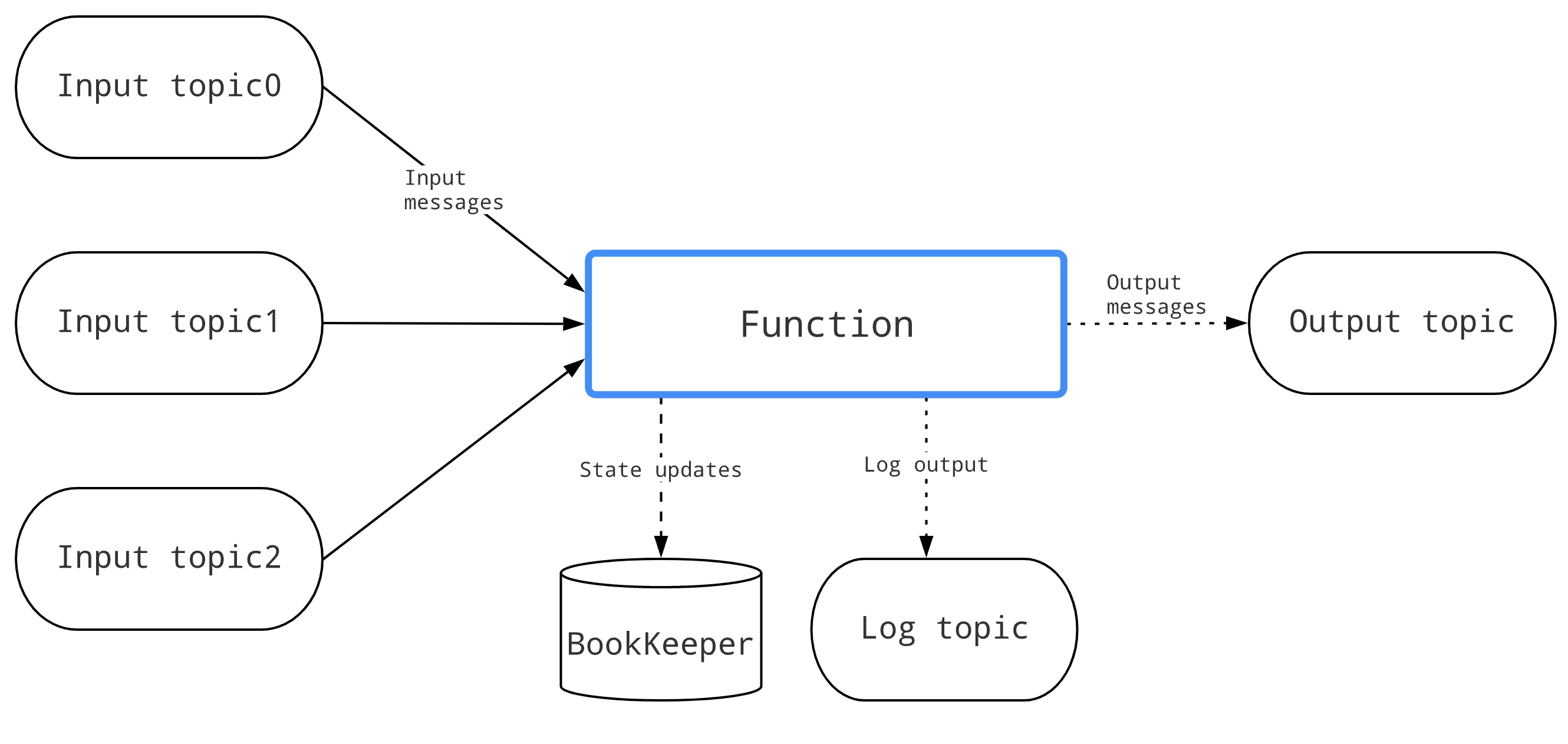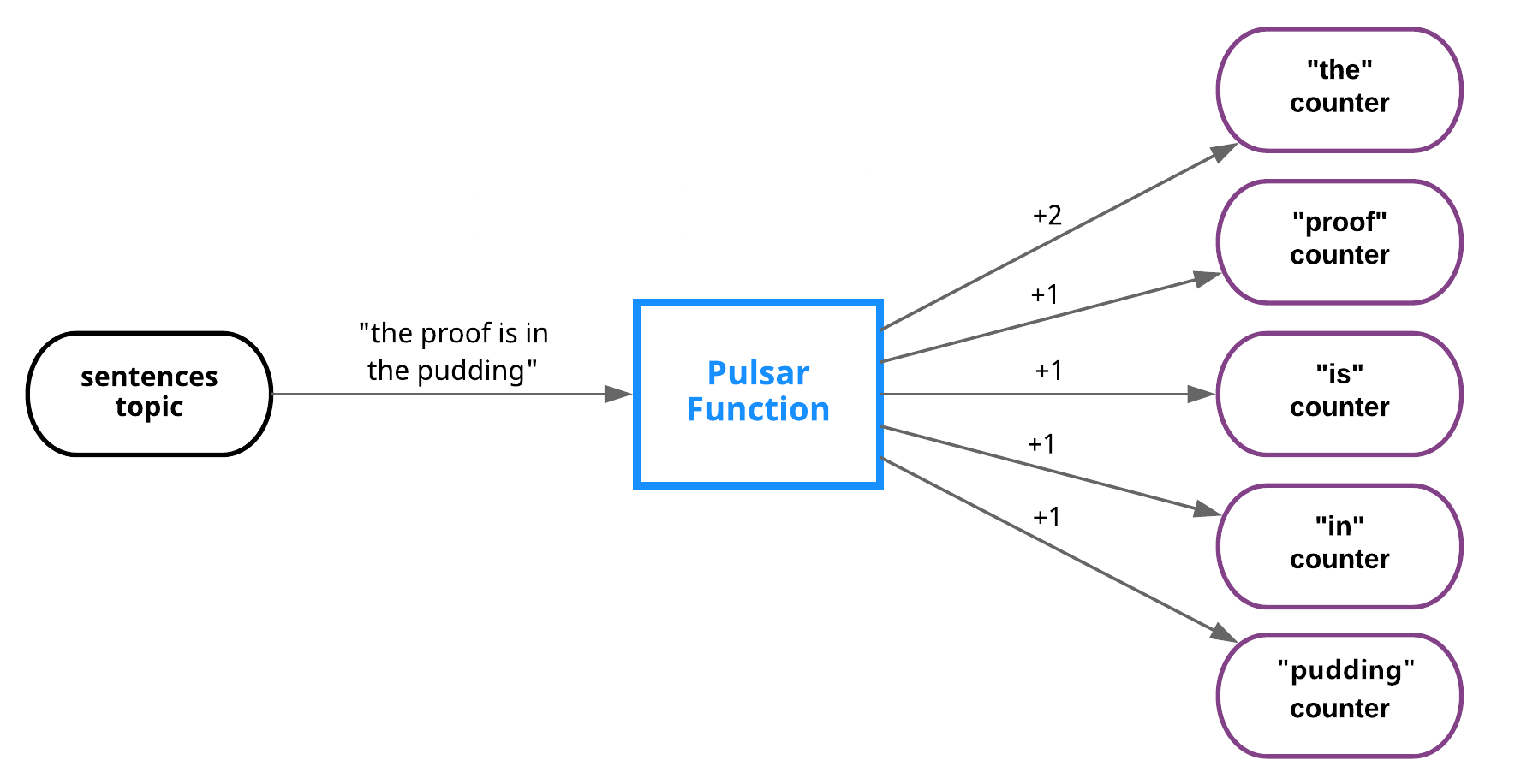用 Pulsar 开发多人小游戏(六):用 Pulsar Function 制作房间计分板
本文是《用 Pulsar 开发多人在线小游戏》的第三篇,配套源码和全部文档参见我的 GitHub 仓库 play-with-pulsar 以及我的文章列表。
Pulsar Function 允许你编写函数对 topic 中的数据进行一些处理,函数的输入就是一个或多个 topic 中的消息,函数的返回值可以发送到其他 topic 中。
官网的一张图就能看明白了:

比方说,发送到 topicA 中的消息都是英文单词,我想把这些英文单词都转化成大写并转发到 topicB 中,那么就可以写一个 Pulsar function 做这个事情。
Pulsar Function 还支持 Stateful Storage,简单来说就是键值对的存储服务。
比如官网给了一个单词计数器的例子:

这个 Pulsar Function 会从一个 topic 中读取句子并切分成单词,然后统计每个单词出现的频率。
单词频率其实是以键值对的形式存储在这个 Function 中的,可以通过 admin API 来读取键对应的值,官网文档:
https://pulsar.apache.org/docs/next/functions-quickstart/#start-stateful-functions
Pulsar Function 可以单独部署成服务,也可以上传到 broker 上,作为 broker 的一部分。不过目前社区的建议是部署单独的 Function 集群。
目前 Pulsar 支持使用 Python、Go、Java 来开发 Function,API 文档:
https://pulsar.apache.org/docs/next/functions-develop-api/
文档给出的例子比较少,可以直接看 Pulsar Function examples,直接根据需求选择合适的 Function 进行开发就行了。
本文就以炸弹人游戏为例,利用 Pulsar Function 开发游戏房间的计分板功能。
在我们的炸弹人游戏中,玩家的死亡也会被抽象成事件发送到 topic 中:
type UserDeadEvent struct {
// 被炸死的玩家名
playerName string
// 杀手玩家名
killerName string
}
类似单词计数器,我们这里也可以实现一个 Pulsar Function,专门过滤玩家死亡的 UserDeadEvent 事件,然后统计 killerName 出现的次数,就可以作为该玩家的分数了。
当然,我们需要实时更新房间内玩家的分数,所以每个游戏房间除了 event topic 和 map topic 之外,我们还需要一个 score topic,让 Pulsar Function 把分数更新事件输出到 score topic,并且利用 Pulsar client 的 tableview 功能做一个比较好的展现。
那么现在需要实现的 Pulsar Function 有如下需求:
1、因为玩家产生的事件都发到了格式为 {roomName}-event-topic 的 topic 中,所以函数应该接收所有这些 topic 的消息。
2、读取这些消息的 Type 字段,过滤出 UserDeadEvent 事件,并读取 playerName 和 killerName,killerName 出现的次数就是该玩家获得的分数。
3、还需要把玩家分数输出到另一个格式为 {roomName}-score-topic 的 topic 中。
下面开始开发。
Function 的开发
先贴官网文档:
https://pulsar.apache.org/docs/next/functions-develop-api/#use-sdk-for-javapythongo
首先需要设置 Pulsar Function 开发相关的 Maven 依赖:
<dependency>
<groupId>org.apache.pulsar</groupId>
<artifactId>pulsar-functions-api</artifactId>
<version>${pulsar.version}</version>
</dependency>
然后就可以开始开发了,完整的源码在 function-code 目录:
public class ScoreboardFunction implements Function<GenericJsonRecord, Void> {
@Override
public Void process(GenericJsonRecord input, Context context) {
String type = (String) input.getField("type");
if (type.equals("UserDeadEvent")) {
String player = (String) input.getField("name");
String killer = (String) input.getField("comment");
if (player.equals(killer)) {
// kill himself
return null;
}
// get the source topic of this message
Optional<String> inputTopic = context.getCurrentRecord().getTopicName();
if (inputTopic.isEmpty()) {
return null;
}
// calculate the corresponding topic to send score
Optional<String> outputTopic = changeEventTopicNameToScoreTopicName(inputTopic.get());
if (outputTopic.isEmpty()) {
return null;
}
// roomName-playerName as the stateful key /
// store the score in stateful function
String killerKey = parseRoomName(inputTopic.get()).get() + "-" + killer;
context.incrCounter(killerKey, 1);
// send the score messages to score topic
long score = context.getCounter(killerKey);
try {
// player name as the key, score as the value
context.newOutputMessage(outputTopic.get(), Schema.STRING)
.key(killer)
.value(score + "")
.send();
} catch (PulsarClientException e) {
// todo: ignore error for now
e.printStackTrace();
}
}
return null;
}
}
因为我们前文给 topic 中的消息设置了 JSON Schema,所以这里设置 topic 中的消息类型为 GenericJsonRecord。
这段代码的逻辑应该不难理解,input 就是发到 event topic 的消息,通过 Pulsar Function 的 context 可以拿到这个 event topic 的名字,由于 event topic 名字包含游戏房间名,所以只要修改 event topic 名称后缀即可得到 score topic 的名字。
函数的主要工作是过滤出 UserDeadEvent,读取 killerName。考虑到不能把不同房间的击杀事件混在一起,我把 {roomName}-{killerName} 作为 Function 的键,并递增计数器记录玩家的分数,最后调用 context.newOutputMessage 把玩家的分数发送到房间对应的 score topic 中。
Function 的调试
可以参考这篇官网文档,用 localrun 模式在本地调试 Function:
https://pulsar.apache.org/docs/next/functions-debug-localrun/
localrun 模式相当于直接在本地起了一个 Function worker,能够连接到 Pulsar,并运行我们刚才开发的 Function 代码。
完整的源码在 function-code 目录,注意我们要对 Function 进行正确的配置,比如 Function 类以及作为输入的 topic 名称等等:
String inputTopic = ".*-event-topic";
// enable regex support to subscribe multiple topics
HashMap<String, ConsumerConfig> inputSpecs = new HashMap<>();
ConsumerConfig consumerConfig = ConsumerConfig.builder().isRegexPattern(true).build();
inputSpecs.put(inputTopic, consumerConfig);
functionConfig.setInputSpecs(inputSpecs);
functionConfig.setClassName(ScoreboardFunction.class.getName());
配置完 functionConfig 后可以启动一个本地的 Function worker:
LocalRunner localRunner = LocalRunner.builder()
.brokerServiceUrl("pulsar://localhost:6650")
.stateStorageServiceUrl("bk://localhost:4181")
.functionConfig(functionConfig)
.build();
localRunner.start(false);
其中 brokerServiceUrl 是 Pulsar broker 的连接地址,stateStorageServiceUrl 是提供 stateStorage 的 bookkeeper 地址,默认情况下在 4181 端口。
这样,只要启动 main 函数,就会启动 local runner,并加载我们刚开发的 Function,把所有后缀为 -event-topic 的 topic 中的消息输入给 Function。
计分板的开发
我们刚才开发的 Function 会把玩家名称和该玩家获得的分数作为一条消息的键和值发送到 {roomName}-score-topic 中,那么玩家客户端如何获取这些信息呢?这就要用到之前介绍的 tableView 功能了。
可以在游戏客户端代码中看到 tableView 的使用:
tableView, err := client.CreateTableView(pulsar.TableViewOptions{
Topic: roomName + "-score-topic",
Schema: pulsar.NewStringSchema(nil),
SchemaValueType: reflect.TypeOf(""),
})
我们在游戏数据中维护一个名为 scores 的 lru 缓存,存储最近的最多 5 名玩家的分数信息,同时利用 tableView 的 ForEachAndListen 方法更新 lru 缓存:
client.tableView.ForEachAndListen(func(playerName string, i interface{}) error {
score := *i.(*string)
g.scores.Add(playerName, score)
return nil
})
这样,当玩家分数更新时,lru 缓存中的数据就会更新,我们只要把对应的分数数据显示到游戏界面上即可。
更多高质量干货文章,请关注我的微信公众号 labuladong 和算法博客 labuladong 的算法秘籍。









· 分享一个免费、快速、无限量使用的满血 DeepSeek R1 模型,支持深度思考和联网搜索!
· 使用C#创建一个MCP客户端
· ollama系列1:轻松3步本地部署deepseek,普通电脑可用
· 基于 Docker 搭建 FRP 内网穿透开源项目(很简单哒)
· 按钮权限的设计及实现